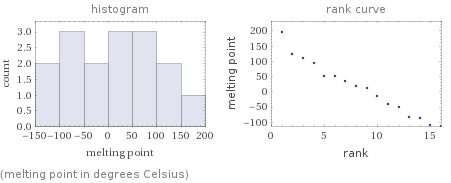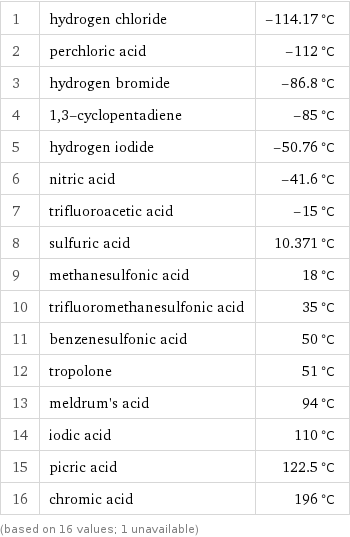Input interpretation

strong acids | melting point
Summary

median | 14.19 °C highest | 196 °C (chromic acid) lowest | -114.17 °C (hydrogen chloride) distribution | | (based on 16 values; 1 unavailable)
Entity with missing value

isothiocyanic acid
Distribution plots

(melting point in degrees Celsius)
Melting point rankings

1 | hydrogen chloride | -114.17 °C 2 | perchloric acid | -112 °C 3 | hydrogen bromide | -86.8 °C 4 | 1, 3-cyclopentadiene | -85 °C 5 | hydrogen iodide | -50.76 °C 6 | nitric acid | -41.6 °C 7 | trifluoroacetic acid | -15 °C 8 | sulfuric acid | 10.371 °C 9 | methanesulfonic acid | 18 °C 10 | trifluoromethanesulfonic acid | 35 °C 11 | benzenesulfonic acid | 50 °C 12 | tropolone | 51 °C 13 | meldrum's acid | 94 °C 14 | iodic acid | 110 °C 15 | picric acid | 122.5 °C 16 | chromic acid | 196 °C (based on 16 values; 1 unavailable)
Unit conversions for median melting point 14.19 °C

287.3 K (kelvins)

57.53 °F (degrees Fahrenheit)

517.2 °R (degrees Rankine)

11.35 °Ré (degrees Réaumur)

14.95 °Rø (degrees Rømer)
Comparison for median melting point 14.19 °C

1.37 °C below temperature at STP (standard temperature and pressure), using the US customary convention (60 °F)

0.8145 °C below temperature at STP (standard temperature and pressure), using the convention of European and South American natural gas companies (15 °C)

0.1855 °C above average surface temperature of the earth (14 °C)
Corresponding quantities

Thermodynamic energy E from E = kT: | 25 meV (millielectronvolts)

Blackbody energy flux Φ from Φ = σT^4: | 387 W/m^2 (watts per square meter)

Approximate luminous exitance from a planar blackbody radiator perpendicular to its surface: | 1×10^-22 lx (lux)